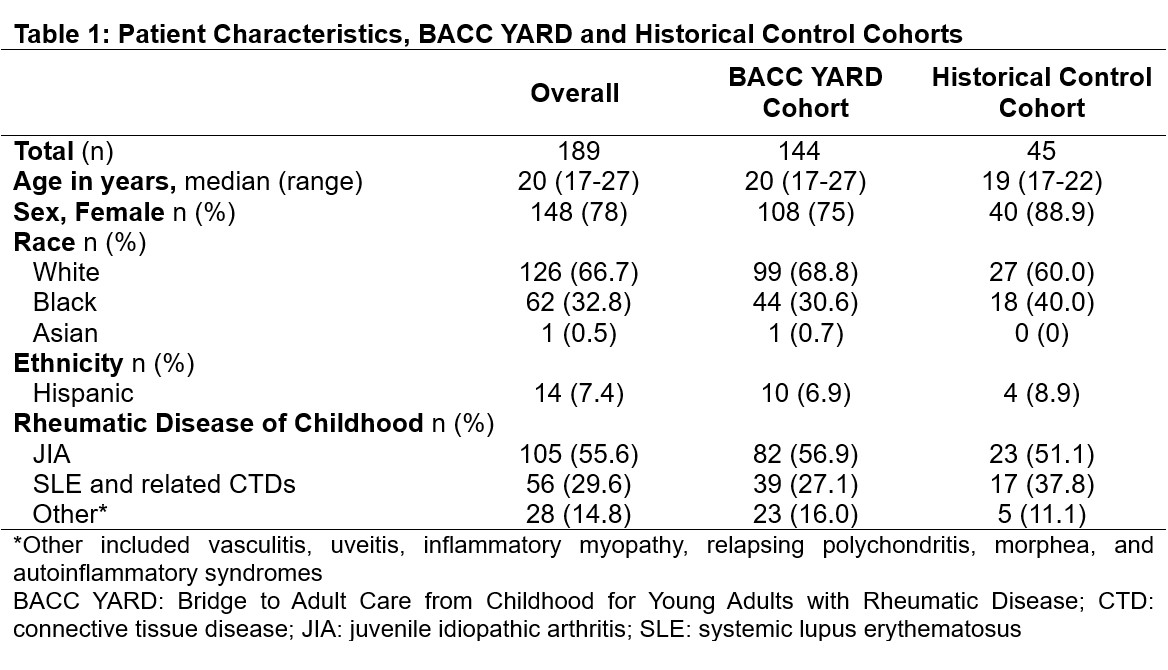Session Information
Session Type: Poster Session C
Session Time: 10:30AM-12:30PM
Background/Purpose: The transition from pediatric to adult-oriented rheumatology care is a critical period for young adults with childhood-onset rheumatic diseases. The Bridge to Adult Care from Childhood for Young Adults with Rheumatic Disease (BACC YARD) Program offers a dual provider pre-transfer visit to facilitate successful transition. This study evaluates whether the dual provider pre-transfer visit improves intervals for subsequent adult rheumatology visits, compared to historical controls without a formal pre-transfer visit.
Methods: We conducted a retrospective cohort study of 189 young adults with childhood-onset rheumatic disease who transferred from Children’s of Alabama to the University of Alabama, Birmingham adult rheumatology clinic. The intervention group (n=144) enrolled in the BACC YARD Program between July 2020-April 2024 and completed a dual provider pre-transfer visit. The historical control group (n=45) transferred between March 2018-February 2020 without a structured pre-transfer visit. The primary exposure was participation in the BACC YARD program and the primary outcome was the number of days from the last pediatric visit to the first adult visit. Secondary outcomes included the interval (in days) between first and second adult visits, and adherence to provider-recommended follow-up intervals. Wilcoxon rank-sum and Kruskal-Wallis tests were used to compare median intervals between groups. Logistic regression models were used to estimate associations between successful adherence to provider-recommended intervals, adjusted for age, sex, race, ethnicity, and diagnosis in the BACC YARD group.
Results: The median age was 20 years in both cohorts. Females comprised 75% of the BACC YARD group and 89% of the control group. Juvenile idiopathic arthritis (JIA) was the most common diagnosis (56%, n=105) in both cohorts, followed by systemic lupus erythematosus (SLE) (30%, n=56). The BACC YARD group demonstrated significantly shorter median time from the last pediatric to the first adult visit compared to controls (143 vs. 261 days, p=0.0049), particularly among patients with JIA (148 vs. 316 days, p=0.0145). No significant difference was observed for patients with SLE. Among the BACC YARD group, the median interval between the first and second adult visits was 148 days (range: 22 to 605), with no significant differences across diagnosis groups. 71% (n=102) had their first adult visit within 30 days of their recommended follow-up date with no factors significantly associated with first visit adherence. 58% (n=83) had a second visit within 30 days of their recommended follow-up date. Hispanic patients were 80% less likely to adhere to the second visit compared to non-Hispanic patients (OR= 0.2, 95% CI: 0.05-0.90, p=0.035).
Conclusion: Participation in the BACC YARD program was associated with a shorter time interval to initial adult rheumatology clinic visit, particularly for patients with JIA. While most patients in the program continued to adhere to recommended timing for follow-up, disparities were observed by ethnicity in second visit adherence. These findings support embedding pre-transfer coordination into transition models to improve continuity for adolescents with rheumatic disease.
 Table 1: Patient Characteristics, BACC YARD and Historical Control Cohorts
Table 1: Patient Characteristics, BACC YARD and Historical Control Cohorts
.jpg) Table 2: Days from last pediatric visit to first adult visit, BACC YARD Cohort vs Historical Control Cohort
Table 2: Days from last pediatric visit to first adult visit, BACC YARD Cohort vs Historical Control Cohort
.jpg) Table 3: Days from first to second adult visit, BACC YARD Cohort (7/2020-4/2024, Nf144)
Table 3: Days from first to second adult visit, BACC YARD Cohort (7/2020-4/2024, Nf144)
To cite this abstract in AMA style:
Eltoum A, Rife E, Timmerman L, Smitherman E, Mannion M, Bridges J. The Bridge to Adult Care from Childhood for Young Adults with Rheumatic Disease (BACC YARD) Program, a Pediatric-To-Adult Rheumatology Transition Program, Reduces Median Time between Final Pediatric, First Adult, and Second Adult Visits [abstract]. Arthritis Rheumatol. 2025; 77 (suppl 9). https://acrabstracts.org/abstract/the-bridge-to-adult-care-from-childhood-for-young-adults-with-rheumatic-disease-bacc-yard-program-a-pediatric-to-adult-rheumatology-transition-program-reduces-median-time-between-final-pediatric/. Accessed .« Back to ACR Convergence 2025
ACR Meeting Abstracts - https://acrabstracts.org/abstract/the-bridge-to-adult-care-from-childhood-for-young-adults-with-rheumatic-disease-bacc-yard-program-a-pediatric-to-adult-rheumatology-transition-program-reduces-median-time-between-final-pediatric/
